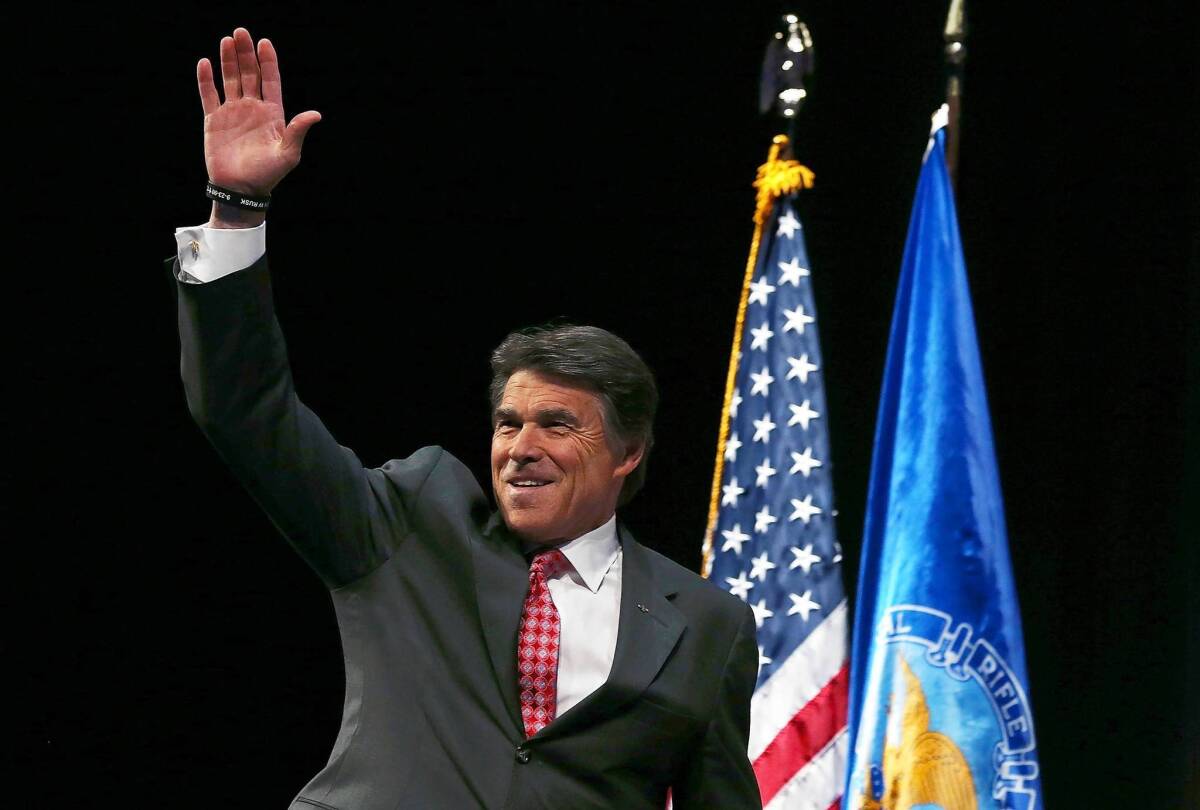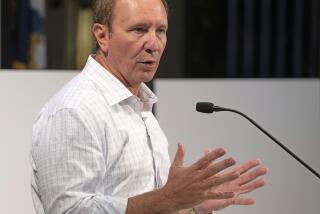Could Rick Perry be Texas’ comeback kid?

AUSTIN, Texas — For nearly 30 years, Rick Perry enjoyed an unbroken record of campaign success, winning 10 straight elections. Then, in 2012, the Texas governor waged a spectacularly unsuccessful bid for president.
It was not just that Perry fell short of the Republican nomination; more than half a dozen contestants, of varying plausibility, waged equally unavailing efforts.
Rather, it was the nature of Perry’s free fall that did the real damage.
In just a few months, he went from national front-runner to the brain-frozen bumbler who couldn’t remember all three points in his own government-reduction plan, an episode that turned a sheepish “oops!” into his campaign epitaph.
The extent of the damage may grow clearer when Perry makes a pair of important decisions: whether to seek an unprecedented fourth term next year as governor and, beyond that, whether to make another try for the White House in 2016.
The guessing has captivated lawmakers, lobbyists, reporters, campaign strategists, prospective candidates — in short, just about everyone in this capital city, save its starving artists and the tourists trawling the country bars and famous live-music scene along Sixth Street.
Perry has said little publicly about his thinking and declined to be interviewed. With the Legislature in session there is little reason to announce his plans; if he chooses to step aside that would only hasten his irrelevance.
There is no doubting, however, that Perry is already a diminished figure, even after entering textbooks as the longest-serving governor in Texas history.
State lawmakers wrestled him over leadership of the state’s flagship university and scaled back the tax cuts that he had made a top priority. They slapped at him with measures to impose term limits and end double-dipping. (The governor makes $242,000 a year in combined salary and a state pension he gets after exercising a rule allowing him to officially “retire” while staying in office.)
Worse, perhaps, the condition known as Perry fatigue — first detected years ago — has grown more acute.
Sharon Griffith, a Republican volunteer in Waco, appeared to speak for many when she suggested the governor’s time was up.
“I don’t think his heart’s really in it. Let someone else run the wagon awhile,” said Griffith, 69. Her husband, Jim, agreed. “Hell, he’s been in there how long?” the strapping 85-year-old chimed in during a recent county GOP luncheon. “Thirteen years? That’s plenty.”
In a University of Texas poll, conducted in February for the Texas Tribune, just 26% of those surveyed said they would support Perry if he ran for governor again, while 36% indicated they would vote against him. A third said it depended who else was running.
The most important person to watch is state Atty. Gen. Greg Abbott, a Republican who had $18 million in the bank at the end of 2012 — three times Perry’s bankroll — and has not ruled out running for governor next year regardless of what the incumbent decides. (Barring a miracle, fluke or some combination, whoever wins the GOP nomination will be Texas’ next governor.)
For all of that, it would be rash to count Perry out if he seeks a fourth term. Entering the 2010 campaign, his approval numbers were dismal and he faced a primary challenge from then-Sen. Kay Bailey Hutchison, who was considered the most popular politician in Texas at the time. He whooped her — easily — to win his third term.
Another try for president, though, may be something else entirely.
Others have run unsuccessfully and come back to win at least the GOP nomination, including Bob Dole, John McCain and Mitt Romney. Each, however, lost to a candidate seen as the front-runner — Perry’s role, for a time — and none performed as poorly as he did.
His debate performances in particular, capped by the “oops” moment, painted Perry — maybe unfairly, perhaps indelibly — as inept and none too bright.
That could prove an exceedingly high hurdle to overcome.
David Beckwith, an Austin communications consultant who spent four years in the White House working with former Vice President Dan Quayle, considers himself an expert on the difficulties facing a politician-turned-punch-line. “Once it happens,” he said, “it’s almost impossible to reverse.”
Perry is not expected to announce his reelection decision until well into the summer; it is unclear whether he will also reveal at that time his intentions regarding a second presidential bid.
If he runs again he would start out with one advantage: Unlike the last time, Perry won’t have to deal with high expectations.
More to Read
Sign up for Essential California
The most important California stories and recommendations in your inbox every morning.
You may occasionally receive promotional content from the Los Angeles Times.











